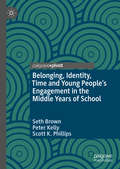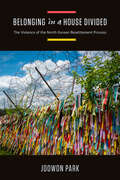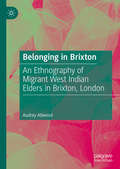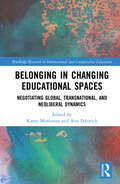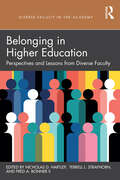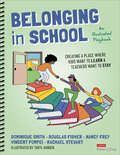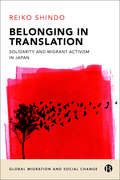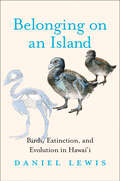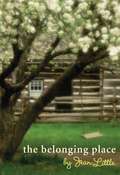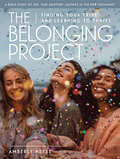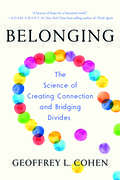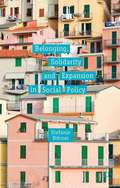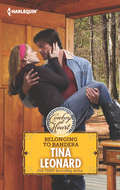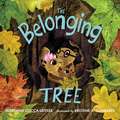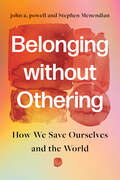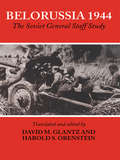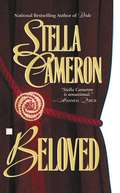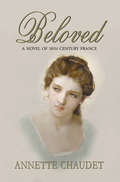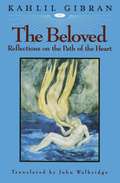- Table View
- List View
Belonging, Identity, Time and Young People’s Engagement in the Middle Years of School
by Seth Brown Peter Kelly Scott K. PhillipsThis book explores the complex ways in which belonging, identity and time are entangled in shaping young people engagement with the middle years of school. The authors argue that these ‘entanglements’ need to be understood in ways that move beyond a focus on why individual young people engage with the middle years. Instead, there should be a focus on the socio-ecologies of particular places, and the ways in which these ecologies shape the possibilities of young people engaging productively in the middle years. Drawing on extensive qualitative data from an outer-urban metropolitan context, this book will appeal to scholars of sociology, education and policy studies.
Belonging in a House Divided: The Violence of the North Korean Resettlement Process
by Joowon ParkBelonging in a House Divided chronicles the everyday lives of resettled North Korean refugees in South Korea and their experiences of violence, postwar citizenship, and ethnic boundary making. Through extensive ethnographic research, Joowon Park documents the emergence of cultural differences and tensions between Koreans from the North and South, as well as new transnational kinship practices that connect family members across the Korean Demilitarized Zone. As a South Korean citizen raised outside the peninsula and later drafted into the military, Park weaves in autoethnographic accounts of his own experience in the army to provide an empathetic and vivid analysis of the multiple overlapping layers of violence that shape the embodied experiences of belonging. He asks readers to consider why North Korean resettlement in South Korea is a difficult process, despite a shared goal of reunification and the absence of a language barrier. The book is essential reading for anyone interested in anthropology, migration, and the politics of humanitarianism.
Belonging in Brixton: An Ethnography of Migrant West Indian Elders in Brixton, London
by Audrey AllwoodThis volume provides a unique perspective on elderly working-class West Indian migrants in the UK, particularly examining how they negotiate their sense of belonging. Utilizing the life span gaze and including elements of oral history and narrative, this ethnography provides rich insight into the ordinary lives, migratory circumstances, social networks, and interactions with the state as residents in a sheltered housing scheme in Brixton, London. The author further compiles a variety of genealogy charts, providing a uniquely vivid scholarly analysis of the Caribbean migrant experience both in a “place” and through space and time. Ultimately, this work contemplates how communities face change whilst at once developing a local symbolic cultural site, navigating adaptation to new economic and social environments.
Belonging in Changing Educational Spaces: Negotiating Global, Transnational, and Neoliberal Dynamics (Routledge Research in International and Comparative Education)
by Karen Monkman Ann FrkovichThis book explores the impacts on personal and professional, local and global forms of belonging in educational spaces amidst rapid changes shaped by globalization. Encouraging readers to consider the idea of belonging as an educational goal as much as a guiding educational strategy, this text forms a unique contribution to the field. Drawing on empirical and theoretical analyses, chapters illustrate how educational experience informs a sense of belonging, which is increasingly juxtaposed against a variety of global dynamics including neoliberalism, transnationalism, and global policy and practice discourses. Addressing phenomena such as refugee education, large-scale international assessments, and study abroad, the volume’s focus on ten countries including Japan, Sierra Leone, and the US demonstrates the complexities of globalization and illuminates possibilities for supporting new constructions of belonging in rapidly globalizing educational spaces. This text will benefit researchers, academics, and educators with an interest in international and comparative education, multicultural education, and educational policy more broadly. Those interested in the sociology of education and cultural studies within education will also benefit from this volume.
Belonging in Higher Education: Perspectives and Lessons from Diverse Faculty (Diverse Faculty in the Academy)
by Terrell L. Strayhorn Nicholas D. Hartlep Fred A. Bonner IIBelonging in Higher Education: Perspectives and Lessons from Diverse Faculty illuminates autoethnographic stories of belonging in higher education in the United States. Chapter counter/stories are contributed by African American, Asian American, Latinx American, Indigenous American, and BIPOC individuals who work in diversity-related positions in the academy. Chapters are written by faculty who work in different institutional contexts such as Predominantly White Institutions (PWIs); minority-serving institutions (MSIs) like Historically Black Colleges and Universities (HBCUs); and institutional types such as community colleges, teaching-focused, and research-focused institutions. Chapter authors represent a range of diversities, coming from a variety of inter- and transdisciplinary backgrounds in terms of their fields of study and research foci, including Education, Psychology, Sociology, and Gender Studies. The counter/narratives in the book celebrate diverse experiences and offer unique and useful insights about how to foster what foreword author, Michael Eric Dyson, refers to as “deep belonging,” particularly for those who have been ostracized, marginalized, or expelled while working in higher education. This critical volume is an essential reading for researchers, faculty, administrators, and graduate students in Education, Sociology, Psychology, Student Affairs, African American Studies, and Asian American Studies. Additionally, it offers crucial insights for individuals who are key stakeholders in foregrounding policy that centers belonging for diverse faculty.
Belonging in School: Creating a Place Where Kids Want to Learn and Teachers Want to Stay--An Illustrated Playbook
by Dominique Smith Douglas Fisher Nancy Frey Vincent Pompei Rachael StewartUnlock a treasure trove of learning—make room for belonging in school Belonging is an instinctual feeling: you know when you feel it—and you really know when you don’t. Creating a sense of belonging in the classroom has a significant impact on student learning and well-being; it serves as a gatekeeper for other aspects of learning to take root. But how do we create classrooms and schools where every student knows they belong? This easy-to-use, illustrated playbook has you covered. 11 evidence-based modules feature actions and strategies that teachers can apply to help students feel more included. Interactive features such as essential questions and reflective prompts are designed to engage educators and deepen their understanding of the importance of connection and belonging in a student′s educational experience. Readers will find Detailed coverage of the 11 dimensions of belonging Evidence-based actions in every module to help foster belonging, balanced between elementary and secondary levels Interactive features like Essential Questions, Two Truths and a Lie, Case in Point, What′s Your Advice? and What′s Next? to facilitate engagement and reflection A highly visual illustrated style to promote comprehension and information retention By utilizing this playbook’s strategies to create environments where students feel a sense of belonging, educators can help improve learning outcomes and academic performance while supporting the overall well-being of their students.
Belonging in School: Creating a Place Where Kids Want to Learn and Teachers Want to Stay--An Illustrated Playbook
by Dominique Smith Douglas Fisher Nancy Frey Vincent Pompei Rachael StewartUnlock a treasure trove of learning—make room for belonging in school Belonging is an instinctual feeling: you know when you feel it—and you really know when you don’t. Creating a sense of belonging in the classroom has a significant impact on student learning and well-being; it serves as a gatekeeper for other aspects of learning to take root. But how do we create classrooms and schools where every student knows they belong? This easy-to-use, illustrated playbook has you covered. 11 evidence-based modules feature actions and strategies that teachers can apply to help students feel more included. Interactive features such as essential questions and reflective prompts are designed to engage educators and deepen their understanding of the importance of connection and belonging in a student′s educational experience. Readers will find Detailed coverage of the 11 dimensions of belonging Evidence-based actions in every module to help foster belonging, balanced between elementary and secondary levels Interactive features like Essential Questions, Two Truths and a Lie, Case in Point, What′s Your Advice? and What′s Next? to facilitate engagement and reflection A highly visual illustrated style to promote comprehension and information retention By utilizing this playbook’s strategies to create environments where students feel a sense of belonging, educators can help improve learning outcomes and academic performance while supporting the overall well-being of their students.
Belonging in Translation: Solidarity and Migrant Activism in Japan (Global Migration and Social Change)
by Reiko ShindoThis is the first book to investigate how migrants and migrant rights activists work together to generate new forms of citizenship identities through the use of language. Shindo's book is an original take on citizenship and community from the perspective of translation, and an alluring amalgamation of theory and detailed empirical analysis based on ethnographic case studies of Japan.
Belonging on an Island: Birds, Extinction, and Evolution in Hawai'i
by Daniel Lewis“A book devoted to the beauty of [Hawaiian] birds . . . is a welcome event. [It] will be both an elegy and an important record of what has been lost to us all.” —W. S. Merwin, Pulitzer Prize–winning poet, The Shadow of SiriusA lively, rich natural history of Hawaiian birds that challenges existing ideas about what constitutes biocultural nativeness and belongingThis natural history takes readers on a thousand-year journey as it explores the Hawaiian Islands’ beautiful birds and a variety of topics including extinction, evolution, survival, conservationists and their work, and, most significantly, the concept of belonging. Author Daniel Lewis, an award-winning historian and globe-traveling amateur birder, builds this lively text around the stories of four species—the Stumbling Moa-Nalo, the Kaua‘I ‘O‘o, the Palila, and the Japanese White-Eye.Lewis offers innovative ways to think about what it means to be native and proposes new definitions that apply to people as well as to birds. Being native, he argues, is a relative state influenced by factors including the passage of time, charisma, scarcity, utility to others, short-term evolutionary processes, and changing relationships with other organisms. This book also describes how bird conservation started in Hawai‘i, and the naturalists and environmentalists who did extraordinary work.“With insight, humor, scholarship, and love, Daniel Lewis illustrates how and why the question of who or what “belongs” somewhere is both deceptively complex and increasingly important in today’s Anthropocene world.” —Robert J. Cabin, author of Restoring Paradise: Rethinking and Rebuilding Nature in Hawai‘i“Lewis’s fascinating story of Hawaii is, in microcosm, the history of humans on our fragile Earth.” —Bruce M. Beehler, National Museum of Natural History, Smithsonian Institution
The Belonging Place
by Jean LittleAll her life, Elspet Mary seems to have known nothing but loss; her mother died, then her father, leaving her with her Aunt Ailsa and Uncle Will Gordon. Just as she is beginning to feel at home, she must go to the New World in Upper Canada. What awaits Elspet Mary in the strange new land?
The Belonging Project - Women's Bible Study Guide with Leader Helps: Finding Your Tribe and Learning to Thrive (The Belonging Project)
by Amberly NeeseDiscover true community. Has the pursuit of the "perfect life" left you feeling depleted, disappointed, dissatisfied, and disconnected? Are you tired of being lonely and left out at work, home, church, and online? Are you hungry for true community, deeper connection with God, and friendships that are greater than just "likes" on social media? Are you ready for real connections with those around you? In this four-week Bible study, Amberly Neese provides biblical and practical help for cultivating meaningful relationships that glorify God through an exploration of four "one another" sayings in the New Testament: Love one another Serve one another Build up and strengthen one another Forgive one another In her trademark style, Amberly combines Bible study with delightful humor to create a refreshing and engaging experience that will encourage and equip women to pursue deeper relationships and true belonging. Other components for the Bible study, available separately, include a DVD. Bible Study Features: A shorter, four-week study is ideal for in-between or busy times. Accessible and friendly format. DVD features the amazing Amberly Neese, who masterfully combines solid Bible teaching and delightfully funny humor (in four 20-minute segments). Inspires and encourages women to pursue deeper relationships and true belonging for a more fulfilled, purposeful life. Helps women grow in their capacity to love, serve, and forgive. Study guide with leader helps includes group session guides, discussion questions, prayers, video viewer guides, and more.
Belonging Rules: Five Crucial Actions That Build Unity and Foster Performance
by Brad DeutserLeaders have an unprecedented opportunity to overcome the great disconnect between employers and employees by inviting individuals to become part of something bigger than themselves—to belong.Belonging Rules gives leaders the tools, knowledge, and confidence to harness belonging to address the workplace&’s most critical challenges.The need to belong is innate and enduring, yet often elusive. Genuine belonging requires a bold approach, one that offers both depth and credibility to the work required from leaders whose organizations are craving a sense of connection, security, and acceptance. Belonging Rules offers nuanced, direct guidance for navigating both the pre-existing and ever-evolving social and organizational demands of today&’s workplace. The five rules within, based on extensive research and application, create a framework to dissect and decode the complex, complicated, and controversial issues of the modern workforce. Executive coach and award-winning management consultant Brad Deutser gives leaders the confidence to address the most critical societal imperative—belonging. His approach doesn&’t tell leaders what to do, rather he provides leaders with the how to:Identify the heart of existing power structures and societal mandatesReframe the impact of inclusion at an individual and organizational levelChallenge and fundamentally redefine the relationship with diverse stakeholdersLeading can be uncomfortable. This guide will empower leaders to shift attention, understanding, and effort toward bridging differences and uniting the &“movable middle&” which depowers the extremes, driving necessary change and desired performance.
Belonging: The Science of Creating Connection and Bridging Divides
by Geoffrey L. CohenFinalist for The Next Big Idea Bookclub • Book of the Year Selection Behavioral Scientist and Greater Good Society “This is perhaps the richest book on belonging you’ll ever read.… The inspiration one draws from every page of this book is an enhanced sense of what is possible. It revives the very thing we need most in these times: hope.” —Claude M. Steele, author of Whistling Vivaldi Discover the secret to flourishing in an age of division: belonging. In a world filled with discord and loneliness, finding harmony and happiness can be difficult. But what if the key to unlocking our potential lies in this deceptively simple concept? Belonging is the feeling of being a part of a group that values, respects, and cares for us—a feeling that we can all cultivate in even the smallest corners of social life. In Belonging: The Science of Creating Connection and Bridging Divides, Stanford University professor Geoffrey L. Cohen draws on his own and others’ groundbreaking scientific research to offer simple, concrete solutions for fostering a sense of belonging. These solutions can generate surprisingly significant and long-lasting benefits. Small but powerful actions can bolster belonging—actions such as encouraging people to reflect on their core values before they face a challenge or expressing belief in someone’s capacity to reach a higher standard. A wide range of innovative approaches have been found to boost achievement at work and at school, bridge political divides, reduce prejudice, and even contribute to overall health. Rigorously tested in diverse arenas—from classrooms to disadvantaged neighborhoods to iconic Silicon Valley companies—these methods offer a path forward in these demanding times. Belonging is a compelling read for all who yearn for a more connected world, whether you’re a manager or employee, an educator or student, a parent or caregiver, or simply someone seeking to make the most out of every moment you spend with others. Packed with actionable insights and specific strategies, this book offers hope and practical guidance, serving as both an inspiration and a roadmap to creating a world of inclusion, understanding, and empathy.
Belonging, Solidarity and Expansion in Social Policy
by Stefanie BörnerThis book examines the relationship of belonging and social policy in a historical-comparative perspective reconstructing individual arguments in favour of or opposed to the expansion of solidarities.
Belonging, Therapeutic Landscapes, and Networks: Implications for Mental Health Practice
by Ezra GriffithWhy are certain places perceived to be therapeutic, to make people feel better about life, about themselves, and about their bodies? Could there be environmental, individual, societal, and attachment factors that come together in the healing process in both traditional and non-traditional landscapes? This observation is particularly important and has implications for the understanding of both healing and disruption in the lives of individuals. In Belonging, Therapeutic Landscapes, and Networks, Dr. Griffith examines factors that influence the intersection of health and place, one’s sense of belonging, and the constructing of therapeutic spaces that minimize psychosocial disruption in our daily lives.
Belonging Through a Psychoanalytic Lens
by Rebecca Coleman CurtisWatching people protest, one hypothesis is that underlying these actions for specific justifiable causes is a sense of wishing to belong, of wishing not to be alone. Recent knowledge from patients and empirical research shows the importance of belonging to groups to both psychological and physical well-being. The problems of many students, minority group members, immigrants, terrorists, and lonely people are linked to an insufficient sense of belonging. Whereas psychoanalytic theory has focused on the need for a secure attachment to a primary caretaker, it has failed to note the importance of a sense of belonging to the family group, a friendship group, a community, a religious group, a nation-state, etc. This book demonstrates the difficulties faced by those who immigrate, those who never feel a sense of their true selves as belonging in a family or a cohesive professional group, and the difficulties of psychoanalysts themselves in knowing where they belong in patients’ lives. The problems of breaking up marital and professional relationships as well as our relationship with the Earth are also discussed. Freudian theory rejected the idea of a sense of "oneness" with humanity as being infantile. Recent developments regarding the similarities between meditational practices and psychoanalysis have questioned Freud’s idea. This book shows the importance of an interpersonal/relational psychoanalysis focusing on real relationships and not simply one that examines inner conflicts. It will be useful to psychologists, other mental health practitioners, social scientists, and anyone with normal struggles in life.
Belonging to Bandera
by Tina LeonardThe Greatest AdventureWhen Holly Henshaw, wedding planner extraordinaire, left her no-good fiancé at the altar, she decided then and there: no more true love. Adventure, excitement, freedom-that's what she wanted. She'd change her business, change her life...and if she was lucky, she'd kiss a cowboy along the way.That's when she flagged down Bandera Jefferson, a long, tall Texan offering her a ride into the sunset. Ornery, possessive and handsome as the dickens, he was making wild-at-heart Holly think she just might like belonging to Bandera.
Belonging to Bandera
by Tina LeonardHolly Henshaw wanted freedom, adventure, excitement, but didn't expect to be slowed down by an ornery, possessive cowboy. But wild-at-heart Holly has begun to think she just might like belonging to Bandera.
Belonging to the Nation: Inclusion and Exclusion in the Polish-German Borderlands, 1939-1951
by John J. KulczyckiWhen the Nazis annexed western Poland in 1939, they quickly set about identifying Polish citizens of German origin and granting them the privileged legal status of ethnic Germans of the Reich. Following Germany's defeat in World War II, Soviet-dominated Poland incorporated eastern Germany and proceeded to do just the opposite: searching out Germans of Polish origin and offering them Polish citizenship. Underscoring the processes of inclusion and exclusion that mold national communities, Belonging to the Nation examines the efforts of Nazi Germany and postwar Poland to nationalize inhabitants of the contested Polish-German borderlands. Histories of the experience of national minorities in the twentieth century often concentrate on the grim logic of ethnic cleansing. John Kulczycki approaches his topic from a different angle, focusing on how governments decide which minorities to include, not expel. The policies Germany and Poland pursued from 1939 to 1951 bear striking similarities. Both Nazis and Communist Poles regarded national identity as biologically determined-and both found this principle difficult to enforce. Practical impediments to proving a person's ethnic descent meant that officials sometimes resorted to telltale cultural behaviors in making assessments of nationality. Although the goal was to create an ethnically homogeneous nation, Germany and Poland allowed pockets of minorities to remain, usually to exploit their labor. Kulczycki illustrates the complexity of the process behind national self-determination, the obstacles it confronts in practice, and the resulting injustices.
The Belonging Tree
by Maryann Cocca-LefflerThe Belonging Tree is a thoughtful picture book about respect, inclusion, and acceptance in a woodland community of animals from writer Maryann Cocca-Leffler and illustrator Kristine A. Lombardi.Life was ordinary in the big oak tree on Forest Lane. Squirrels lived in every part of the tree, and the Gray squirrel family inhabited the knot in the middle. But the neighborhood starts to change as the big oak tree welcomes families of chipmunks, beavers, and birds. And with each new arrival, the Grays become increasingly unhappy. Can’t everything remain just as it was?It will take an unexpected moment of heroism from a thoughtful inhabitant to finally open hearts and bind together this diverse animal community.Christy Ottaviano Books
Belonging without Othering: How We Save Ourselves and the World
by john a. powell Stephen MenendianThe root of all inequality is the process of othering – and its solution is the practice of belonging We all yearn for connection and community, but we live in a time when calls for further division along the well-wrought lines of religion, race, ethnicity, caste, and sexuality are pervasive. This ubiquitous yet elusive problem feeds on fears – created, inherited – of the "other." While the much-touted diversity, equity, and inclusion initiatives are undeniably failing, and activists narrowly focus on specific and sometimes conflicting communities, Belonging without Othering prescribes a new approach that encourages us to turn toward one another in unprecedented and radical ways. The pressures that separate us have a common root: our tendency to cast people and groups in irreconcilable terms – or the process of "othering." This book gives vital language to this universal problem, unveiling its machinery at work across time and around the world. To subvert it, john a. powell and Stephen Menendian make a powerful and sweeping case for adopting a paradigm of belonging that does not require the creation of an "other." This new paradigm hinges on transitioning from narrow to expansive identities – even if that means challenging seemingly benevolent forms of community-building based on othering. As the threat of authoritarianism grows across the globe, this book makes the case that belonging without othering is the necessary, but not the inevitable, next step in our long journey toward creating truly equitable and thriving societies. The authors argue that we must build institutions, cultivate practices, and orient ourselves toward a shared future, not only to heal ourselves, but perhaps to save our planet as well. Brimming with clear guidance, sparkling insights, and specific examples and practices, Belonging without Othering is a future-oriented exploration that ushers us in a more hopeful direction.
Belorussia 1944: The Soviet General Staff Study (Soviet (Russian) Study of War #No. 12)
by David M. Glantz Harold S. OrensteinA new edited translation of the Soviet Staff study of the Red Army's Belorussian operation in the summer of 1944, which was unprecedented in terms of its scale, scope and strategic consequences. The Soviet Stavka had planned a campaign consisting of a series of massive operations spanning the entire Soviet-German front. Four powerful fronts (army groups) operated under close Stavka (high command) control. Over 1.8 million troops acomplished a feat unique in the history of the Red Army: the defeat and dismemberment of an entire German army group. This book is a translation of the Soviet General Staff Study No 18, a work originally classified as 'secret' and intended to educate Soviet commanders and staff officers. The operation is presented from the Soviet perspective, in the words of the individuals who planned and orchestrated the plans. A map supplement, including terrain maps, is provided to illustrate the flow of the operation in greater detail.
Beloved (Rossmara Family #4)
by Stella CameronFive years earlier Saber, the Earl of Avenall, had won her young fancy, then mysteriously vanished. Now fate reunites them and Ella stands before him: grown, beautiful, seductive. Even as Saber swears never to taint her with his own dark demons, he cannot resist her. Nor can he stand idle while vicious ton gossips set out to ruin her. As their passion grows, so does his inner torment. Yet Ella knows that together they must face society--and each other's secrets--if they are to realize the full bliss of their love.
Beloved: A Novel of 18th Century France
by Annette ChaudetPeopled with unforgettable characters, Beloved is a feast of a novel that sweeps the reader away to the opulent world of 18th century France where Christina DiClementi, daughter of an Italian silk merchant plans to marry her childhood sweetheart Richard Magniet, son of the Baron de Beauvu. But a lifetime of expectations is shattered by a violent murder that sets them both on an uncharted course of heary rending loss, erotic obsession and new allaiances. From the houses of the nobility and the great abbey of Montmajour to the brothels of a bustling city, and from a simple island cottage to the canals of Venice, these two people struggle to mold their lives around the memory of love that will ultimately reshape itself into something far beyond themselves.
The Beloved
by Kahlil Gibran John WalbridgeExquisite writings on love, marriage, and the spiritual union of souls add a fresh dimension to our understanding of the philosophy of love and the transformation of one's life through its all-encompassing power.
